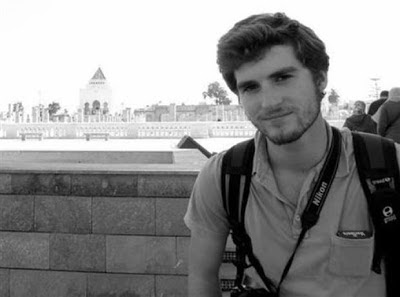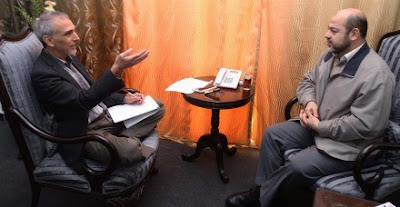Unfortunately, I think we’ll have to wait a while longer to get a good sense of how the Egyptian uprising and protests will affect Israel and her relations with neighboring Egypt. One interesting story that I’ve been following during the continued unrest in Egypt has been the role of Jewish people in the situation.
Category: Egypt
In modern Hebrew, we use the word kaved to mean heavy, as in that sofa is too kaved for me to move. It can also mean a burden. The medieval commentator Rashi mentions this meaning in his commentary on the verse, and adds another meaning of kaved that many of us are familiar with. From the fifth commandment of the Ten Commandments, kabed et avicha v’et imecha – that we should honor our parents – we understand kaved to mean honor or respect. Similarly, from the same root of course is the word for an honor that is given out in synagogue, a kavod. Finally, the word kaved also means liver, the heaviest part of our body. So to review, Abraham, we learn in our parsha this morning is wealthy. We know this from the Hebrew word kaved, which is an unusual choice for wealthy, and also according to the dictionary connotes honor, respect, dignity, seriousness, heaviness, burdensome, taxing, laborious, and liver.
Here it is used to mean that Abraham was weighted down with many possessions because of his wealth. But in the very next verse, we learn that Abraham traveled from the Negev to Beit El “in stages,” l’ma-asav. Rashi tells us that the use of this word means that upon Abraham’s return from Egypt, he took the same route back staying in the same places he had lodged on his way down to Egypt. Rashi points out that while Abraham is wealthier now, he has retained his humility and doesn’t choose to stay in nicer places. Abraham, our patriarch, was not altered by his accumulation of wealth. Recognizing the tendency to be burdened by material wealth, Abraham managed to maintain his kavod when he became kaved. This is not always the case.
As we know from the recent financial meltdown, power and wealth can be burdensome and challenging. In our society, such a vast possession of wealth requires much responsibility and integrity. It catapults people into the public eye, living life in a fishbowl, having every business decision scrutinized, every investment maneuver questioned. There are many advantages to a life of wealth, but it must be done while maintaining kavod – honor.
It has now been close to thirty years since women began studying for ordination in Conservative Judaism. Within the Conservative movement, women rabbis have become commonplace and it is no longer an issue for the majority of Conservative congregations. The conversation has shifted from a halachic nature (Can a woman serve as a rabbi according to Jewish law?) to a more social nature (Are women rabbis treated fairly in the rabbinate?).
Truthfully, I never understood how women rabbis are problematic from a Jewish legal standpoint since there’s no problem with women serving as teachers, which is the main function of a rabbi. However, in the Orthodox world, the issue of women rabbis is still in its infancy with a minority of liberal Orthodox leaders like Rabbi Avi Weiss advocating for female rabbinic ordination. The first woman to be ordained by Rabbi Weiss, Rabba Sara Hurwitz, has been successful in her rabbinate but is far from being accepted by most Orthodox Jews.
Over the weekend, I read of support for women rabbis from a most unlikely source. In fact, I did a double take when I read the Jewish Daily Forward’s title for this article: “Hamas Chief on ‘Noble’ Women Rabbis”. Did the leader of Hamas, a known terrorist organization, really come out in favor of the ordination of women as rabbis and call women rabbis “noble”?
It turns out that the Jewish Daily Forward sent the husband (“Rebbetzman”?) of Rabbi Diane Cohler-Esses to Egypt to interview Hamas chief Mousa Abu Marzook over the course of two days before Passover earlier this month. This could have been a great story (Dayenu!) if it were only about a Jewish journalist in Egypt meeting face-to-face with the ruler of a foreign oppressor and trying to get out of Egypt before the holiday commemorating freedom from Egyptian bondage.
But the story gets much better. Journalist Larry Cohler-Esses is married to Rabbi Diane Cohler-Esses, a Conservative rabbi who was ordained from the Jewish Theological Seminary in 1995 and is the first woman from the Syrian Jewish community to become a rabbi (and the first and only person (male or female) from her community to become a non-Orthodox rabbi. She had to give her husband permission to fly to Egypt in the days before Passover to interview the Hamas leader. He was concerned about leaving home during the week of Passover preparation. She flippantly told her husband that he wasn’t much help anyway so he should go to Egypt.
In Egypt, during the two-day interview the two men discussed Passover in the 21st century:
Abu Marzook could not believe I was leaving Cairo so fast, or understand why I’d end up divorced if I didn’t. I explained about the Seder, and about Passover, when the Jews had to…well, leave Egypt really fast. He said, “But that was 4,000 years ago when the Pharaoh was trying to kill the Jews. No one’s trying to kill you now.”
“Actually,” I said, “kind of, you guys are.” And we were off on what ended up being a five-and-a-half hour discussion over those two days.
Surprisingly, what Mousa Abu Marzook was most fascinated with was his interviewer’s rabbi wife. When Cohler-Esses told the Hamas leader that his wife is a rabbi, Abu Marzook was astounded and asked, “There are women rabbis?” he asked.
Cohler-Esses explained to Abu Marzook that about one-half of all rabbinic students in the liberal American seminaries are actually women. He then explained his wife’s personal struggle in becoming a rabbi because of her roots in the Syrian Jewish community. The Hamas leader, whose Muslim religious beliefs treat women as second-class citizens, seemed dumbfounded that she hasn’t been accepted by her community. “She’s done nothing wrong,” he said. “What she’s done is noble.”
Obviously, the issue of women rabbis was only a side conversation in a long and serious interview by Cohler-Esses, who took a small dose of criticism by some for even meeting with a member of Hamas. But this story is amazing. Who would have ever thought that the most vocal proponent of women’s rabbinical ordination in the Orthodox movement might just be the leader of Hamas?


